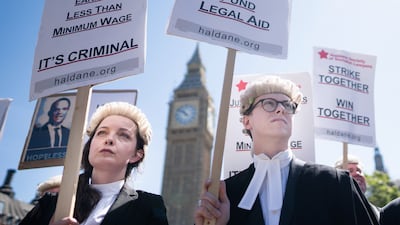Courts across the UK are set to come to standstill next month after criminal barristers in England and Wales voted in favour of an all-out strike over a row with the government over jobs and pay.
Members of the Criminal Bar Association (CBA) have been walking out on alternate weeks but were balloted on whether to escalate the industrial action with an indefinite, uninterrupted strike from September 5.
About 80 per cent of its members backed escalation of industrial action that has run since the end of June.
Lawyers will carry out the open-ended strike until the government improves its offer of a 15 per cent fee increase. The action does not extend to the legal system in Scotland.
The dispute adds to the catalogue of strike action that will face the new government when the Conservative Party announces a successor to UK Prime Minister Boris Johnson on September 5.
The latest setback means the new prime minister will have to face up to a growing list of problems from a cost-of-living-crisis to a discontented workforce striking over pay.
This week thousands of dockers at the country’s busiest container port, Felixstowe, walked out in a pay dispute, while train companies and network operators have caused travel chaos in a series of walkouts this summer.
Earnings from legal aid fell by 23 per cent in one year amid the coronavirus pandemic with more than 80 per cent of CBA members forced into personal debt with government support, the union said.
Junior barristers earn a median income of £12,220 ($14,400) a year, which is below minimum wage, it said.
Legal aid is means-tested government funding available to the accused to help pay for their case and lawyers. Thousands of criminal court hearings have already been disrupted as a result of the action.
The Ministry of Justice previously argued that the 15 per cent increase in fees would mean the average criminal lawyer will earn £7,000 more a year.
The CBA rejected that offer on the basis it did not apply to existing cases or start immediately.
The ballot closed at midnight on Sunday and the result was announced on Monday morning.
According to figures published by HM Courts & Tribunals Service, the Crown Court backlog increased for the third consecutive month in June, reaching 58,973 cases.


